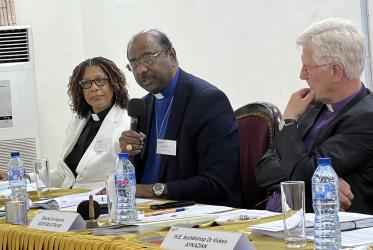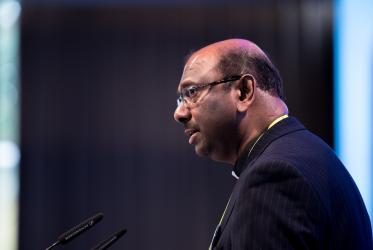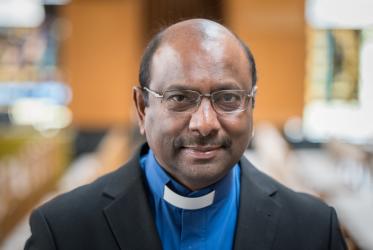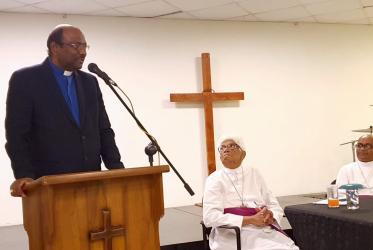VISION FOR THE WORLD COUNCIL OF CHURCHES
WCC Moderator,
Leadership of the Executive Committee,
Members of the Central Committee,
I greet you in the name of our Triune God: Father, Son and Holy Spirit.
Thank you for the opportunity to be considered for the position of general secretary of the WCC and to address you today. Ecumenism has always been part of my ministry DNA, spanning some 35 years as an ordained minister in the Uniting Presbyterian Church in Southern Africa, and before then. This is why I have remained in the process of nomination for the general secretary over the past two years. My service in the WCC is a calling to serve God, the church, and the world.
We are living in very challenging and engaging times. The COVID-19 pandemic, war in the Ukraine, conflict and factions in Ethiopia, Sudan, Mozambique, Palestine and Israel, and other parts of the world, gender-based violence, climate change, poverty, hunger, racism, ethnic conflicts and the list go on – all call for the church to take seriously God’s mission in the world.
In these disruptive times, we are called to be agile, flexible and resilient. How can this be integrated into the governance, leadership and management structures of the WCC? This is something we have to give careful and considerable attention to as we continue to discern the signs of the time.
The vision and mission of World Council of Churches is well captured in the following statement:
The World Council of Churches is a fellowship of churches which confess the Lord Jesus Christ as God and Saviour according to the scriptures, and therefore seek to fulfil together their common calling to the glory of the one God: Father, Son and Holy Spirit.
Emerging out of this, the WCC already has a mission and strategic programmatic plan and priorities which have been approved by the 10th WCC Assembly and encapsulated in the Pilgrimage of Justice and Peace.
In line with the above, I would like to formulate my own vision for the WCC to essentially indicate what I consider to be the main visionary foci and practical operational style for the WCC if I were to be elected as the next general secretary. The following statement expresses my vision for the WCC:
A united, flourishing, sustainable and contextually relevant WCC, praying, worshiping, witnessing and working together to impact and transform the world with God’s love, justice, peace, reconciliation and unity, participating in God’s reign on earth and the fullness of life for all creation.
I would like to offer the following visionary action points/priorities that would enact my vision mentioned above:
- Strengthen the fellowship and visible unity of churches.
The WCC is a fellowship of churches which confess Jesus Christ as Lord and Saviour in heaven and on earth. Our unity, purpose and mission are found in Christ. I believe in the mission, message and significance of the church in the world today. Therefore, visible Christian unity is absolutely necessary to witness to a broken and suffering world. A divided church is a weak and feeble witness to an already fragmented world. My vision for Christian unity is based on John 17:21: “Father that they may be one so that the world may believe you sent me.”
- Implement the vision, mission and priorities of the WCC from the assembly.
One of the important functions of the general secretary is to ensure the implementation of the WCC vision, mission and strategic priorities, and therefore they must be part of the vision plan. An important focus would be the implementation of the strategic priorities that will emerge from the WCC 11th Assembly.
- Engage God’s mission together to save, heal, transform, reconcile and unite humankind and all creation.
The vision is of WCC member churches and partners working together to proclaim the good news of salvation and life in Jesus Christ to the world, knowing that “Christ’s love moves us to reconciliation and unity” (Eph. 5:14). The continued task would be to bring churches together to share in the Missio Dei.
- Work towards unity and justice in the world, holding both together.
I include this as a separate point because it must be a priority for the WCC. Our task as the WCC is not only to work towards visible Christian unity but to also uphold and champion the call for justice and peace in the world. This includes a prophetic and public ministry which takes sides with the poor, oppressed, abused and neglected in the world. The WCC is called to stand where God stands as it reflects God’s justice (including economic, gender and ecological justice) in the world. Unity and justice ought to go together like two sides to a coin or two wings to a bird; you need both to make a difference. We cannot have unity without justice. It is important for us to address these internally as a fellowship of churches so that we proclaim an authentic and credible (external) witness to the world.
- Work with ecumenical organisations, people of other faiths and no faith to create a better world for all creation.
The WCC cannot work independently and exclusively on its own in engaging God’s mission in the world. Its very nature of existence speaks of bringing a very diverse number of member churches together as a fellowship. In this sense it is already ecumenical. The WCC Ecumenical Charter recognises the need for the WCC to work with other ecumenical partners, people of other faiths and no faith to create a better world for all creation. Ecumenism speaks of the whole inhabited world. In summary, it is about taking the whole gospel to the whole person in the whole world. This must continue to be the strong visionary focus of the WCC. We need to work effectively and efficiently with ecumenical partners and honour the value of shared partnerships to transform the world.
- Create safe spaces for honest, truthful and courageous conversations to encompass, understand and dialogue a variety of views.
Earlier I stipulated and stressed the need for Christian unity. Unfortunately, Christian churches often have disunity and disagreement on doctrine, polity, political affiliations and ethical issues. The fragmentation of churches can be seen, for example, on the issues of human sexuality, abortion, the war in Ukraine and Russia, Palestine and Israel conflict, etc. It is important that we do not forsake our unity in Christ while we are divided on these issues. Thus, I believe that the WCC must continue to strengthen and facilitate safe spaces where churches can meet, dialogue, and find one another on these potentially divisive issues. Safe spaces where the unity of Christ and the Holy Spirit are at work.
- Lift the voices of the marginalised and neglected in the WCC so that economic and ecclesial power and authority does not dominate but we create a culture of inclusivity, diversity and equity.
The powerful usually take charge and control of any organisation. How do we in the WCC work at this differently as we consider and exemplify the humility and servant nature of Jesus Christ? I envision a WCC not only creating safe spaces but equal spaces for marginalised, and neglected voices to be heard, respected and appreciated within the fellowship. It requires from all of us a willingness to engage a kenotic (self-emptying) experience as, following Christ, we take seriously the needs of the “other." We need to use the consensus model of decision-making in more creative ways to ensure the freedom of participation.
- Mobilise and Increase commitment among member churches to support the WCC.
I envision a culture of participation and commitment of member churches that they would not have mere periodic episodes of interest in the WCC but that they would be desirous to fully integrate and participate in the life, work and witness of the WCC. The vision must extend to collaborating, visiting, understanding and mobilising member churches. It means inclusion in the programmes, consultations and conversations of the WCC at all levels. The various regions must be empowered and structured for meaningful participation and involvement with the WCC as a whole.
- Reach out to non-member churches to participate in the work of the WCC.
While member churches and ecumenical partners are crucial to the WCC, I envision the extension and expansion to engage, and welcome other churches that are not already part of the WCC, especially if they share in the common mission of proclaiming Christ to the world. While following the procedures and protocols of WCC membership, we present a very welcoming fellowship to those who are not currently members. This is important as we work towards Christian unity and witness in the world.
- Develop the roundtable model of leadership, build staff unity and cohesion.
My vision is to build a strong, focused and united staff team that will serve and fulfil the WCC vision, mission and priorities with joy and devotion. Unity and justice in the WCC begin with the leadership and staff articulating and emulating the same, cascading throughout the fellowship. Staff well-being and productivity are essential for a sustainable and successful WCC.
- Strengthen financial sustainability of the WCC by successfully engaging the Green Village project, relationships with donors and partnerships.
Resources and financial sustainability are crucial to any organisation or institution. A vision for the WCC must entail the same, a vision for a fellowship flourishing in people resources, partnerships, relationships, and finances. Nurturing and caring for partners and donors is important. We need to acknowledge that the sustainability and success of the WCC cannot be measured only on material and financial terms but on the gifts of people themselves, and all that they bring with them from different life experiences and backgrounds.
The above outlines my vision for the WCC and some interacting vision priorities, among others not mentioned, that would shape my leadership as general secretary of the WCC, if given the opportunity.
In conclusion, I would like to say that I have the necessary leadership and management experience for the role of WCC general secretary. My years of experience as minister in congregations, my role as moderator and general secretary of the UPCSA, my numerous portfolios and involvement with international and national ecumenical organisations, my experience with heads of states and interfaith Leaders, and my role as dean of the Faculty of Theology and Religion at the University of Pretoria all adequately equip me for the task. Above these, my love and passion for Jesus, the church and a transforming world are what drives me to be available for this calling.
I thank you for your time and consideration. May God grant you wisdom, peace and joy as you prayerfully discern together the way forward. Blessings!
Jerry Pillay (Rev. Prof. Dr.)





